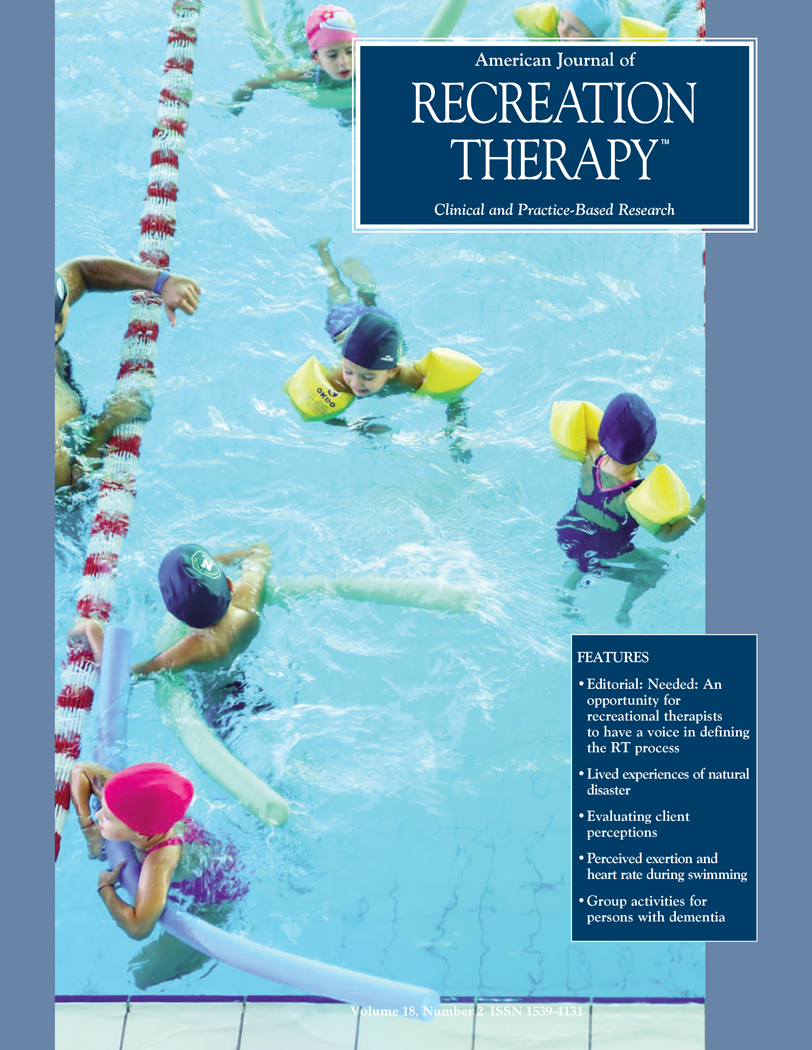Evaluating client perceptions to improve service delivery: Individualized attention to address disabilities
DOI:
https://doi.org/10.5055/ajrt.2019.0186Keywords:
qualitative assessment, program evaluation, health conditionAbstract
A nonprofit organization providing outdoor adaptive therapeutic recreational services routinely administered a customer satisfaction survey to participants. This study analyzed the quantitative and qualitative responses to assess how well participant perceptions reflected the organization’s stated mission to enhance “the quality of life for people with disabilities.” Overall, responses supported the mission, reflecting expressions of empowerment and independence through supportive challenges. Individual responses also reflected a positive, people-centered organizational culture. Another recurrent theme was the importance of individualized adaptations in programing and equipment. Participants also identified areas for improvement. Although not required for funding, nonprofit therapeutic recreation organizations can benefit from formal program evaluation processes which incorporate participant feedback.
References
Bennett JL, Piatt JA, Van Puymbroeck M: Outcomes of a therapeutic fly-fishing program for veterans with combat-related disabilities: A community-based rehabilitation initiative. Community Ment Health J. 2017; 53(7): 756-765. doi:10.1007/s10597-017-0124-9.
Heyne LA, Anderson LS: Theories that support strengths-based practice in therapeutic recreation. Ther Recreation J. 2012; 46(2): 106.
Wilhite B, Shank J: In praise of sport: Promoting sport participation as a mechanism for health among persons with disabilities. Disabil Health J. 2009; 2: 116-127. doi:10.1016/j.dhjo.2009.01.002.
Stebbins RA: New Directions in Serious Leisure. Lewiston, NY: Edwin Mellen, 2001.
Heo J, Lee Y, Lundberg N, et al.: Adaptive sport as serious leisure: Do self-determination, skill level, and leisure constraints matter. Annu Ther Recreat. 2008; 16: 31-38.
Daniels E, Cottingham M, Walsh DW, et al.: An evaluation of university recreation center outdoor programs for people with disabilities: Perspectives from professionals. J Outdoor Recreat. 2017; 9(1): 83-97.
Bullock C, Mahon M, Killingsworth C: Introduction to Recreation Services for People with Disabilities: A Person-Centered Approach. 3rd ed. Urbana, IL: Sagamore Publishing, 2010.
Dattilo J: Leisure Education Program Planning: A Systematic Approach. 3rd ed. State College, PA: Venture Publishing, 2008.
Ryan JB, Katsiyannis A, Cadorette D, et al.: Establishing adaptive sports programs for youth with moderate to severe disabilities. Prev Sch Fail. 2014; 58(1): 32-41. doi:10.1080/1045988X.2012.755666.
Wehmeyer ML, Berkobien R: Self-determination and self-advocacy: A case of mistaken identity. Assoc Persons Severe Handicaps Newslett. 1991; 7: 4.
Stumbo NJ, Wilder A, Zahl M, et al.: Community integration: Showcasing the evidence for therapeutic recreation services. Ther Recreat J. 2015; 49(1): 35.
Published
How to Cite
Issue
Section
License
Copyright 2000-2025, Weston Medical Publishing, LLC and American Journal of Recreation Therapy. All Rights Reserved.


